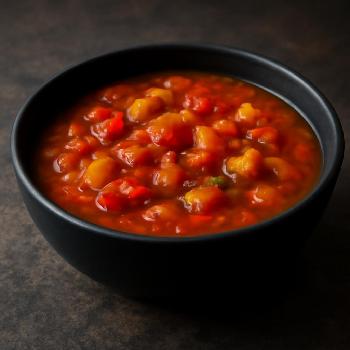Healthy & Special Diets > Recipes for Specific Health Conditions > Recipes for Kidney Disease > Fluid-Restricted Meal Plans
Low-Fluid Tomato and Bell Pepper Soup
A flavorful and kidney-friendly tomato and bell pepper soup designed to minimize fluid intake while providing essential nutrients. This recipe is specifically tailored for individuals with kidney disease on fluid-restricted meal plans. Enjoy a warm and comforting soup that's both delicious and safe for your dietary needs.

Ingredients
- 1 can (14.5 oz) Diced Tomatoes (low sodium)
- 1/2 medium, diced Red Bell Pepper
- 1/2 medium, diced Yellow Bell Pepper
- 1/4 medium, diced Onion
- 2 cloves, minced Garlic
- 1 tablespoon Olive Oil
- 1/2 teaspoon Dried Oregano
- 1/2 teaspoon Dried Basil
- 1/2 cup Low-Sodium Chicken Broth
- to taste Salt
- to taste Black Pepper
Preparation
Heat olive oil in a large pot over medium heat. Add diced onion and cook until softened, about 5 minutes. Add minced garlic and cook for another minute until fragrant. Be careful not to burn the garlic.
Cooking the Vegetables
Add diced red and yellow bell peppers to the pot. Cook for about 5-7 minutes, until slightly softened. This will enhance the flavors of the soup.
Simmering the Soup
Pour in the can of low-sodium diced tomatoes (undrained). Add dried oregano and dried basil. Stir well to combine all ingredients.
Adding Broth and Simmering
Add the low-sodium chicken broth. Bring the soup to a simmer, then reduce the heat to low. Cover the pot and let it simmer for at least 20 minutes to allow the flavors to meld. The longer it simmers, the richer the flavor.
Blending the Soup (Optional)
If you prefer a smoother soup, use an immersion blender to blend the soup directly in the pot. Alternatively, you can carefully transfer the soup to a regular blender in batches and blend until smooth. Be cautious when blending hot liquids.
Seasoning and Serving
Season the soup with salt and black pepper to taste. Remember to be mindful of sodium intake, especially for kidney disease. Serve the soup hot and garnish with fresh herbs if desired.
Nutrition Facts Estimated per 100g of product
Calories: Approximately 40-50 kcal Protein: 1-2g Fat: 2-3g Carbohydrates: 5-7g Sodium: Varies depending on the brand of canned tomatoes and broth used. Choose low-sodium options to minimize sodium intake. Potassium: Present in tomatoes and bell peppers; monitor intake based on individual dietary recommendations.
Other Important Considerations for Nutrition
Portion Control: Be mindful of portion sizes to manage fluid intake effectively. This recipe is designed to be low in fluid but consuming large portions can negate the benefits. Sodium Content: Carefully select low-sodium or no-salt-added canned tomatoes and broth. Sodium management is crucial for kidney disease. Potassium Levels: Tomatoes and bell peppers contain potassium. Individuals with kidney disease should monitor their potassium levels and adjust intake accordingly, based on their doctor's advice. Individual Needs: Consult with a registered dietitian or healthcare provider for personalized dietary recommendations. This recipe is a general guideline and may need adjustments based on your specific medical condition and needs.
FAQ
-
Can I use fresh tomatoes instead of canned?
Yes, you can use fresh tomatoes. Approximately 1.5-2 pounds of fresh tomatoes, peeled and diced, can be used instead of the canned tomatoes. You may need to adjust the cooking time to ensure the tomatoes soften completely. -
Is this recipe suitable for people on dialysis?
This recipe can be suitable for people on dialysis, but it's important to consider individual dietary needs and restrictions, particularly regarding potassium and sodium intake. Consulting with a renal dietitian is recommended to ensure it fits within your specific meal plan. -
Can I add other vegetables to this soup?
Yes, but be mindful of the fluid and potassium content of any additional vegetables. Suitable options in moderation might include carrots, celery, or green beans. Always consult with a healthcare professional or dietitian before making significant changes.
